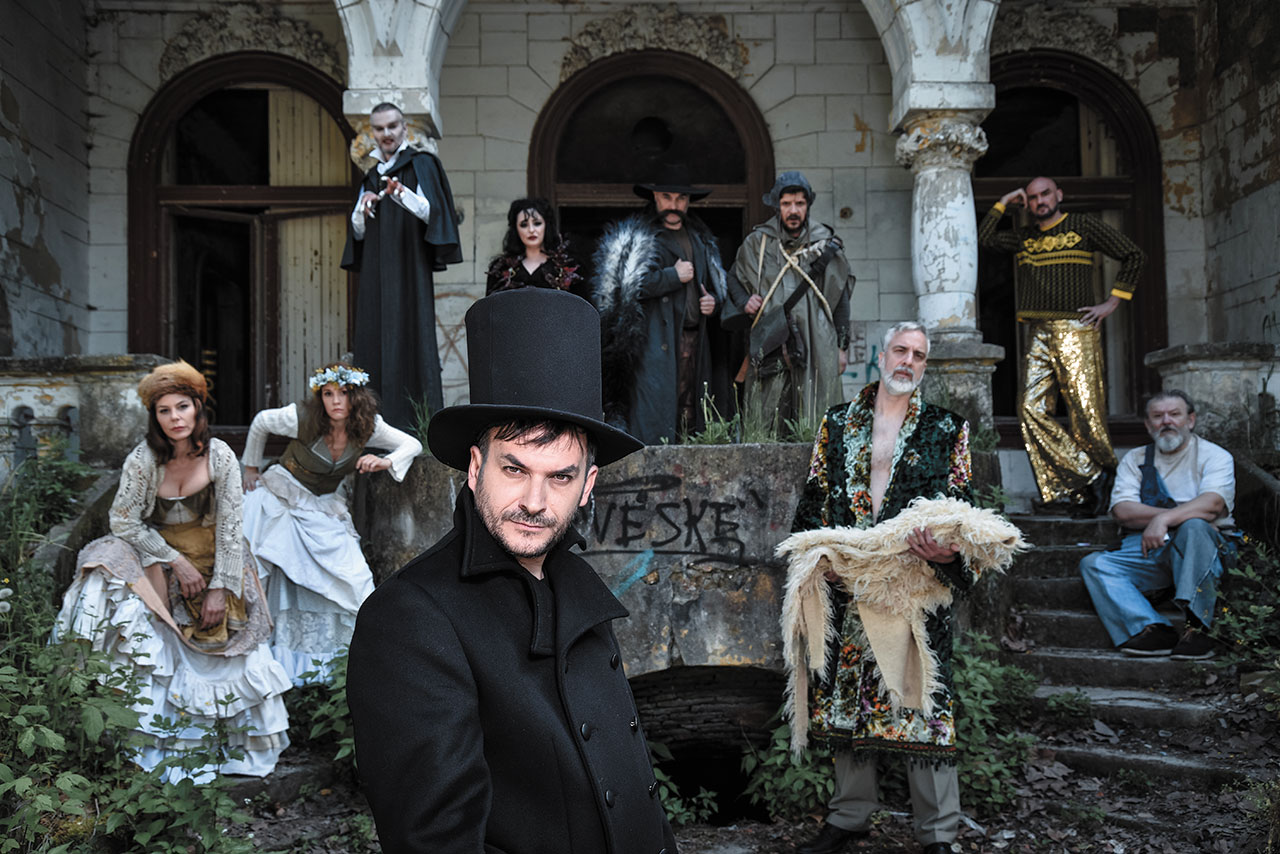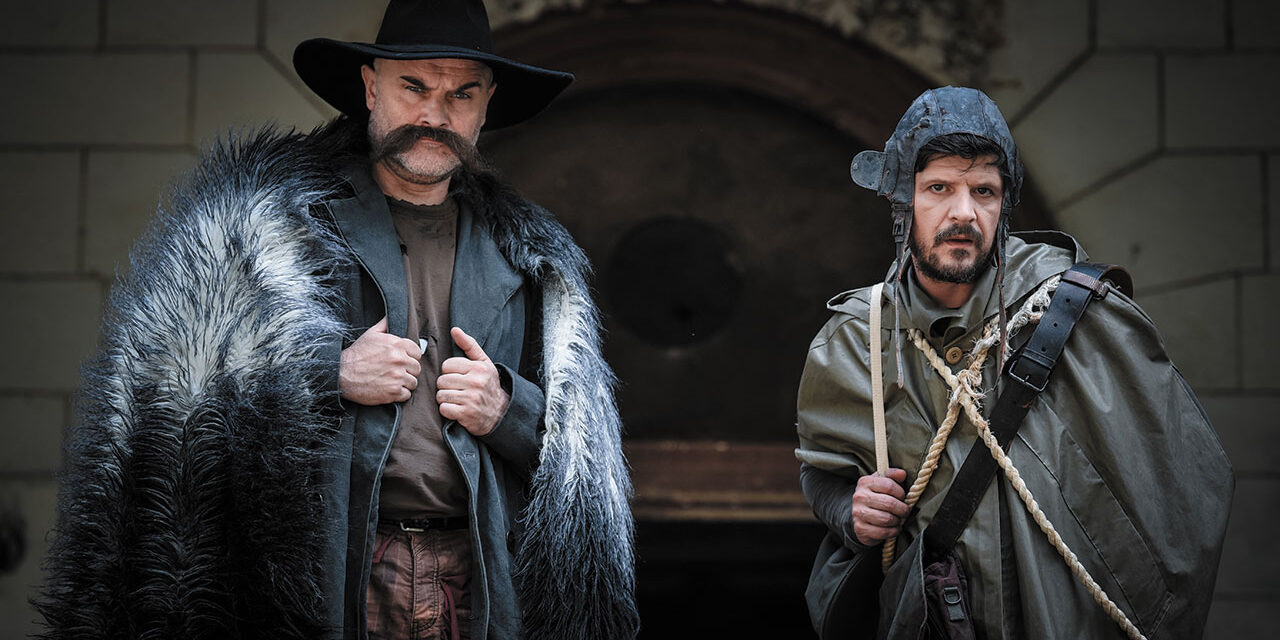Serbian National Theatre, Novi Sad, premiere 17th May 2023
People’s perception that whatever resource they seek is finite – including love, money, kindness and good intentions – is the root cause of almost all the nasty things they do – they approach everything with the idea that you can either vampirize or be vampirized.
This is the main premise of the black comedy Western The Last Balkan Vampire by Dejan Dukovski and directed by Aleksandar Popovski. Vampire hunter Kurta (Nenad Pećinar) comes to a small village with his assistant Mali (Milovan Filipović) in response to a call from the locals who can no longer tolerate the terror of the vampire, who commits various wickedness in their village. He rapes, steals, kills animals, and engages in petty mischief, such as defecating on pies made by hostesses.
In the village, we encounter a priest who doesn’t believe in God (Milorad Kapor), innocent girls who are prostitutes (Višnja Obradović, Jovana Balašević, Jovana Stipić Radošević), a child who is, in fact, an old man (Dušan Jakišić), a neighbour named Vampir who is not in fact a vampire (Branislav Jerković), a wise fool (Marko Marković), and a corrupt village official (Igor Pavlović). Everything is the opposite of what it seems, and the truth about the place and its inhabitants is exposed with the arrival of a stranger.
As Gogol said, Don’t blame the mirror for your ugly face. It is a message that is often conveyed from our theatre stages. A version of Gogol’s play The Government Inspector had its premiere at the same theatre at the end of January this year; The Last Balkan Vampire articulates and addresses contemporary issues of our society more clearly. In addition to the problem of hypocrisy, the Wise Fool speaks about air pollution, institutional inaction, and deteriorating values.
Mali (the Small One) is perhaps the most interesting character in the whole show. He is the companion of Kurta, often lost in his own thoughts. Sometimes he fails to understand simple tasks and questions, but he excels at drawing conclusions and quoting Latin. He is the first to solve the case of the village vampire, and the last to become a vampire.

The Last Balkan Vampire
Popovski’s production has an exceptionally good rhythm in terms of its scene transitions, the appearance of new and previously seen characters, and a good rhythm in terms of dialogue. However, it feels as if it has three endings – first, the story concludes on a verbal level, then through choreography (by Staša Zurovac), and finally, the same information is underscored with a song. The strength of the message is lost in this repetition, by stating and re-stating that all the characters are in fact vampires luring Kurta into their web through their haughtiness, inhumanity, and immorality. However, it must be said, that all three conclusions are solid and well-executed.
What marks production apart are its aesthetics. If Tarantino directed The Government Inspector or Dogville, it would probably look like this. The costumes (Mia Popovska) and set design (Aleksandar Popovski and Željko Piškorić) give it the aesthetic and atmosphere of a film – it is often particularly reminiscent of Tarantino’s The Hateful Eight. Kurta wears a vintage, oversized fur coat, the Widow (Tanja Pjevac) is adorned with a wreath of peppers to ward off evil spells, and Pop is dressed like a disco star… From the back of the theater, the Vampire hunter Kurta might easily be mistaken for Kurt Russell in his Hateful Eight guise. The music (by Marjan Nećak) irresistibly resembles spaghetti westerns spiced with Balkan melodies. These elements, along with the acting style that occasionally captivates with its realism but quickly and effortlessly slips into absurdity and comedy, brilliantly create an atmosphere of wonderment. The humour that permeates the play arises from the inherent absurdity of the situations, the exaggerated acting style, and the clever deployment of irony in the dialogue. It should be noted, however, that at times, there is an overemphasis and overuse of profanity in order to generate laughter.
Furthermore, while the play successfully navigates various genres, combining comedy, satire, western, road movie, and melodramatic scenes between Kurta and the Widow, the development of the storyline falls somewhat short in delivering unexpected twists and turns. Despite the engaging interactions between characters and the dynamic blend of humour and satire, the narrative fails to fully capitalize on the potential of its eclectic genre fusion. The incorporation of an exotic superstitious milieu initially sparks intrigue and promises an element of unpredictability. However, as the plot unfolds, the story becomes somewhat predictable, diminishing the overall impact and leaving the audience longing for more surprising and unconventional narrative choices. Also, in light of the current events in Serbia (weekly civic protests demanding systemic solutions to systemic problems), addressing such a topic in this way and dealing with the theme that we all are guilty of the situation in society in which we find ourselves, feels not just repetitive but perhaps a little tedious.
Credits:
Director: Aleksandar Popovski//Translator from Macedonian: Vera Vasilić//Set designers: Aleksandar Popovski and Željko Piškorić// Costume designer: Mia Popovska// Composer : Marjan Nećak// Choreographer : Staša Zurovac
For tickets and more information, visit: SNP.org.rs
Divna Stojanov is a dramaturg and playwright. She writes mainly for children and young people.








